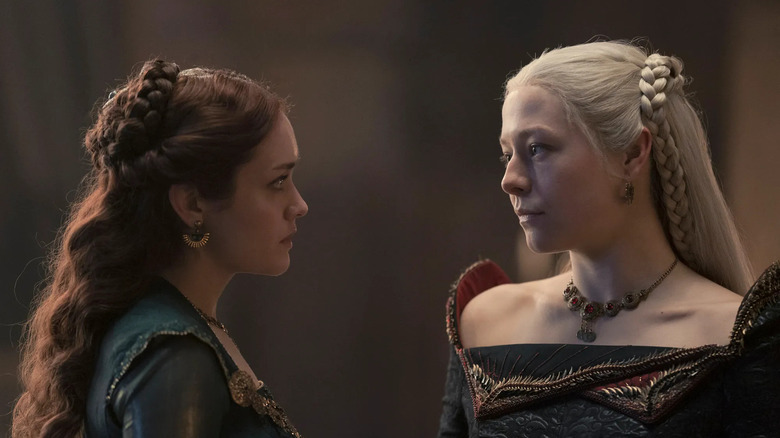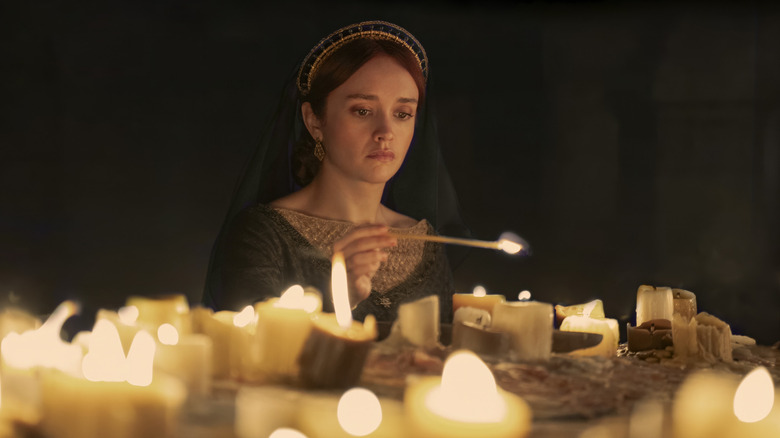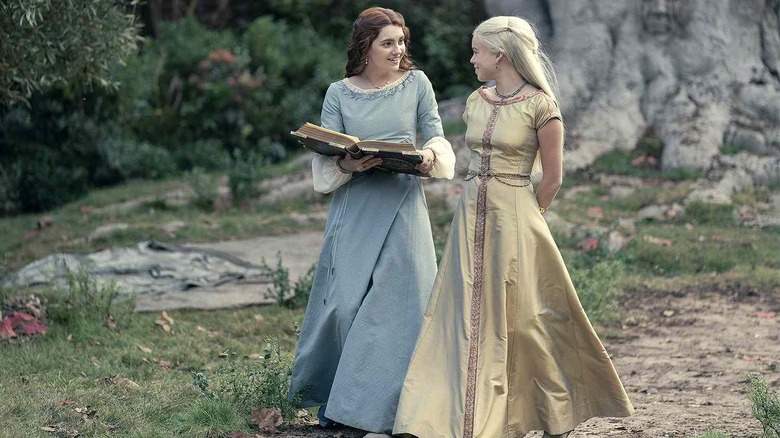House Of The Dragon Season 2's Most Important Scene So Far Was Invented Entirely For The Show
This article contains spoilers for "House of the Dragon" season 2 and "Fire & Blood."
Of all the big changes "House of the Dragon" has made to its source material so far, the choice to age down Alicent (Emily Carey/Olivia Cooke) is perhaps the boldest. In the book that inspired it, "Fire & Blood," Alicent and Rhaenyra (Milly Alcock/Emma D'Arcy) are never particularly close. Alicent's portrayed largely as Rhaenyra's evil stepmom, an older woman who seduces her dad and is out to undermine Rhaenyra's inheritance at every turn. It's possible that book Alicent also has a complicated, sympathetic inner life, but the narrator — a historian recounting the events years later — doesn't let us see it.
When the show decided to turn the two into childhood friends (peers in age and maturity), it guaranteed a far more compelling dynamic between them. Alicent demanding Rhaenyra's son lose an eye in season 1 was dark in the book, for instance, but the show's extra context makes it hit even harder. It stings to see their relationship brought so low precisely because of how sweet they used to be together.
It also complicates things a ton, as the show's had to put a lot of extra work into explaining how and why Alicent's turned against Rhaenyra so strongly over the years. So far, "House of the Dragon" has inclued a whole misunderstood prophecy, a teenage betrayal storyline, and repeated brainwashing from Alicent's father to make it all work. Fans have often wondered if the change was worth it; many have argued that Alicent should've just been allowed to be straightforwardly evil, sparing us all the wishy-washiness. But in the second season's third episode, it becomes clearer than ever why the show's creatives chose this path.
Rhaenyra and Alicent, reunited in secret
The climactic moment of this week's episode involves Rhaenyra dressing up as a nun and sneaking into Alicent's place of private worship. Is it a little ridiculous? Maybe, but because "Fire & Blood" is largely based on public records in the "Game of Thrones" universe, technically this scene doesn't contradict the source material. It's unlikely that the book version of these characters would meet under these circumstances, but it wouldn't have been impossible for them to do this without any grand maesters finding out about it.
Ultimately, their conversation's so compelling that the logistics of how it happened barely even matter; it's cathartic to see these two finally get to talk candidly after so many episodes apart. They finally get to clear up the misunderstanding around Viserys' last words (well, sort of), and at least express their regrets over Lucerys and Jaehaerys' deaths. They can't prevent the war, but they at least get the clarity that comes with knowing the other isn't actively out to get them. Whatever happens from this point forward, Alicent will always know that Rhaenyra tried to stop it, and Rhaenyra at least knows that Alicent isn't taking joy in anything bad that'll happen to her from hereon out.
It's particularly satisfying because book Rhaenyra and book Alicent never get such moment of clarity. They don't meet again until the war's mostly over, at which point all the damage has already been done. If the show had stayed true to this and denied the two any more screentime together, that would make all the extra focus on the pair's relationship feel sort of extraneous. By bringing them back together for one big, surprising scene, the show has provided some much-needed payoff to all that early build-up.
A scene that only heightens the tragedy of House of the Dragon
I hope I'm not spoiling too much of the rest of the show when I say that there's a lot more violence in store. From this point on, the Dance of Dragons will be in full swing; Targaryens and their dragons will be dropping like flies, and anyone lucky enough to survive this conflict will still be left a traumatized shadow of their former selves.
It's with this context that Rhaenyra and Alicent's conversation hits even harder. It's a stark reminder that, as inevitable as this war often felt, it did, in the end, come down to the choices of individual people. If Viserys hadn't married Alicent, if Otto hadn't turned Alicent against Rhaenyra, if Rhaenyra hadn't had three children out of wedlock, if Lucerys hadn't cut Aemond's eye, if Daemond hadn't sent Blood and Cheese into the Red Keep ... If even one of these events had played out differently, it's possible the entire thing could've been averted.
Even here, as Alicent says it's too late, she's not entirely telling the truth. To end the war now would come at a great personal cost to both women, but there are still options that would prevent the senseless tragedies to come. Unfortunately, the resentments between them and their mutual desire for power has grown way too strong to prevent their current trajectories. As much as Rhaenyra and Alicent might care for each other deep down, and as much as they both want to avoid the war to come, that sense of love and compassion just isn't enough. The Dance of the Dragons has now fully begun.
New episodes of "House of the Dragon" season 2 premiere Sundays on HBO and Max.


